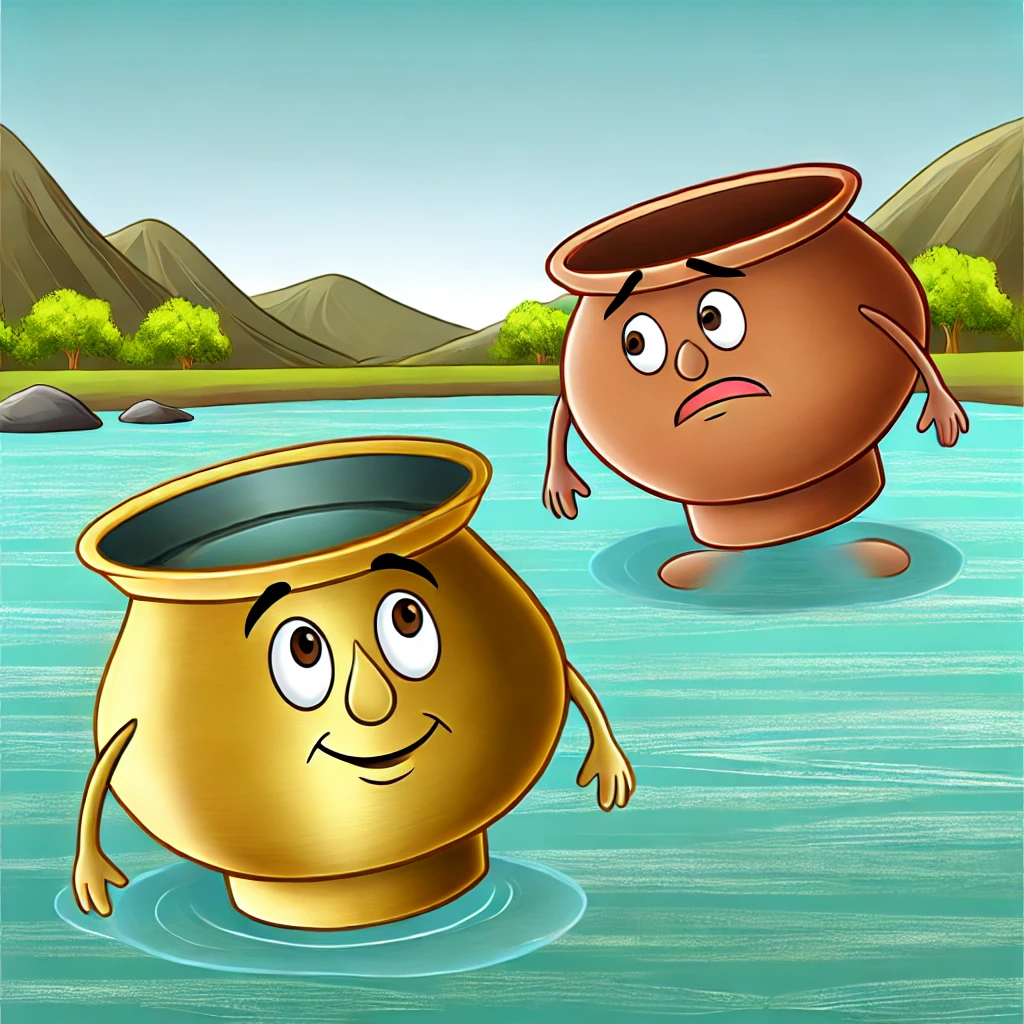Two pots were left by a river, one made of brass and the other of clay. When the water rose, both pots floated down the river. The clay pot tried to stay away from the brass pot. The brass pot said, “Don’t worry, friend. I won’t hit you.”
The clay pot replied, “But if I come close to you, we might touch. If you hit me or I hit you, I will break.”
The strong and the weak cannot stay together.
Two – 二つの
Pots – 壺(potの複数形)
Left – 残された(leaveの過去形)
By – 〜のそばに
River – 川
Made – 作られた(makeの過去分詞)
Brass – 真鍮
Clay – 粘土
Water – 水
Rose – 上昇した(riseの過去形)
Both – 両方の
Floated – 浮かんだ(floatの過去形)
Down – 下へ
Tried – 試みた(tryの過去形)
Stay – とどまる
Away – 離れて
Said – 言った(sayの過去形)
Worry – 心配する
Friend – 友達
Won’t – 〜しない(will notの短縮形)
Hit – ぶつかる
Replied – 返事をした(replyの過去形)
Come – 来る
Close – 近い
Might – 〜かもしれない
Touch – 触れる
Break – 壊れる
Strong – 強い
Weak – 弱い
Cannot – 〜できない
Stay – とどまる
Together – 一緒に
1. Two pots were left by a river, one made of brass and the other of clay.
- Two pots(二つの壺):
- Two は数詞、pots は名詞の複数形です。
- were left(置かれていた):
- be動詞 + 過去分詞で受動態を表しています。「壺が誰かによって川のそばに置かれていた」という意味です。
- by a river(川のそばに):
- by は「〜のそばに」という前置詞です。a river は「一本の川」という意味の名詞句です。
- one made of brass and the other of clay(一つは真鍮製、もう一つは粘土製):
- one と the other は対比表現で使われており、「一つは〜で、もう一つは〜」という形です。
- made of は「〜で作られた」という意味です。
2. When the water rose, both pots floated down the river.
- When the water rose(水位が上がったとき):
- when は接続詞で「〜のとき」を表します。rose は「上がった」という意味の動詞 rise の過去形です。
- both pots(両方の壺):
- both は「両方の」という意味の形容詞です。pots は名詞の複数形です。
- floated down the river(川を下っていった):
- floated は「浮かぶ」の過去形。down は「下って」という意味の副詞で、the river(その川)を修飾しています。
3. The clay pot tried to stay away from the brass pot.
- The clay pot(土の壺):
- the は定冠詞で「特定の」という意味。clay pot は「土の壺」という名詞句です。
- tried to stay away(離れようとした):
- tried は「試みた」の意味の動詞 try の過去形です。try to + 動詞の原形 で「〜しようとする」という意味になります。
- stay away は「離れている」という意味です。
- from the brass pot(真鍮の壺から):
- from は「〜から」を表す前置詞です。the brass pot は「真鍮の壺」という名詞句です。
4. The brass pot said, “Don’t worry, friend. I won’t hit you.”
- The brass pot said(真鍮の壺が言った):
- said は「言った」の意味の動詞 say の過去形です。
- Don’t worry, friend.(心配しないで、友よ。):
- Don’t は「〜しないで」という意味の否定の命令形です。worry は「心配する」という動詞です。
- friend は「友よ」という呼びかけです。
- I won’t hit you.(私は君にぶつからないよ。):
- won’t は「will not」の短縮形で「〜しないだろう」という未来の否定形です。
- hit は「ぶつかる」という動詞です。
5. The clay pot replied, “But if I come close to you, we might touch.”
- The clay pot replied(土の壺が答えた):
- replied は「答えた」の意味の動詞 reply の過去形です。
- But if I come close to you(でも、もし私があなたに近づいたら):
- if は「もし〜なら」を表す接続詞です。come close は「近づく」という表現です。
- to you は「あなたに対して」という意味です。
- we might touch(私たちは触れてしまうかもしれない):
- we は「私たち」という主語です。
- might は「〜かもしれない」という可能性を表す助動詞です。
- touch は「触れる」という意味の動詞です。
6. If you hit me or I hit you, I will break.
- If you hit me or I hit you(もし君が私にぶつかったり、私が君にぶつかったら):
- if は条件を表す接続詞です。hit は「ぶつかる」という意味の動詞で、主語を入れ替えて「君が私に」や「私が君に」という意味になります。
- I will break(私は壊れてしまうでしょう):
- will は未来を表す助動詞です。
- break は「壊れる」という意味の動詞です。
7. The strong and the weak cannot stay together.
- The strong and the weak(強い者と弱い者):
- the strong は「強い者」を指し、the weak は「弱い者」を指します。形容詞が the を伴って名詞化されています。
- cannot stay together(一緒にいることはできない):
- cannot は「〜できない」という否定形です。
- stay together は「一緒にいる」という意味です。



コメント